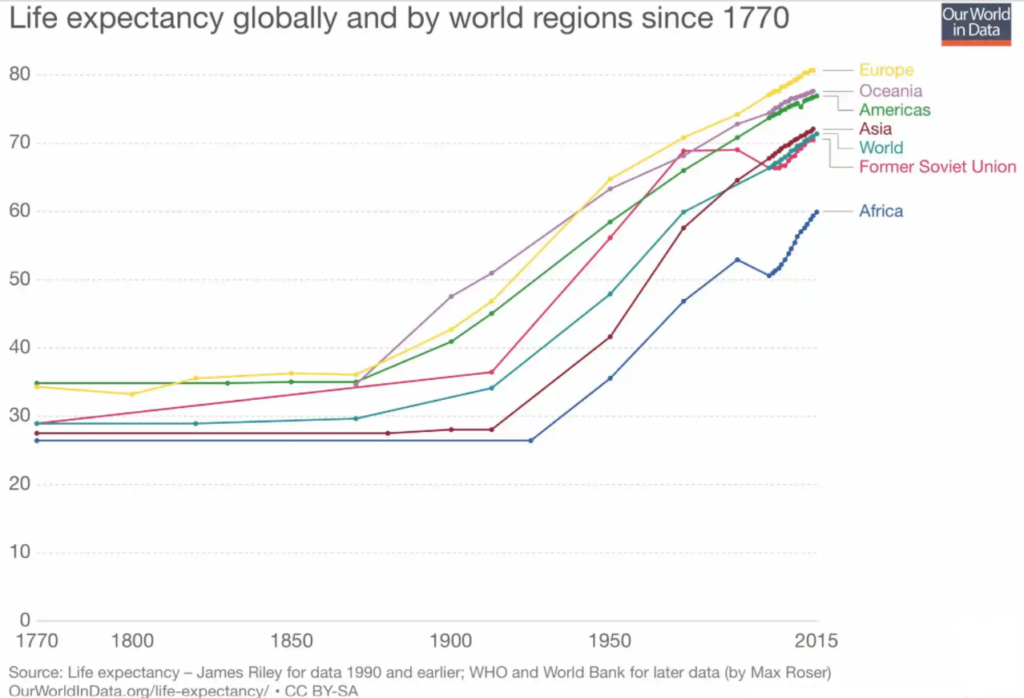The best of times
Okay, despite the fact that we are still not satisfied, that we are still often inclined to existential angst, confusion and despair – can we at least agree that progress, from the human viewpoint, has actually occurred?
I suppose that we have to go with : Yes – If only for the fact that the vast majority of us wouldn’t even be alive without it. A society based on hunting, foraging and pointy sticks simply could not provide for the number of humans alive today. Meaning that most of us wouldn’t even exist were it not for the multitude of cultural and technological adaptations that we have managed to invent since getting such a big brain. My personal favourites are, as mentioned earlier : the washing machine and human rights – to which I’ll add the Ventolin© inhaler, due to my difficulty breathing as a child with asthma.
Some scholars, like Steven Pinker and Hans Rosling, have made the case that, compared to any other period in history, we are living in the best of times. They demonstrate this quite persuasively with the use of simple graphs that plot all the indicators of our wellbeing over time. Indicators like wealth, education, equality, violence, famine, security, health or longevity.

Critics of this theory point to the fact that perfection has not been attained : famine and war still exist. They also pinpoint periods of backpedalling, moments in history when our well being declined – like World Wars, recessions or ecological disasters. True, and sad, as this is, the overall data still stands : we all used to scratch and itch, but many of us now have hot and cold running water.
The only unresolved question is whether we will become the victims of our own success.
Will overpopulation lead to our demise? Will we suffocate in our own waste?
Progress comes with a price, this much is obvious. The debate is clearly essential : Is our present predicament, that some see as the imminent collapse of human civilisation (or even the collapse of the biosphere) an inherent result of Capitalism? Does the problem run deeper, is it part of the human psyche, are we just too greedy, too needy? Or is it just due to our dependence on hydrocarbons? Or our denial of the ecological imperatives?
As important as these questions are, I would first like to take a quick look at how we got here. Here meaning the current global situation. As diverse as this experience is – with some of us barely surviving on a handful of roots a day, having to walk a mile for a drop of water; and others sitting in air-conditioned offices or sipping hot chocolate whilst surfing the net – let’s just agree to call it techno-capitalism. This is just what I’m calling the dominant culture. And even if you’ve only got 10 cents to your name, and have never actually owned a smartphone, you’ve at least seen this techno-capitalist heaven on TV. (I’ll just insert a message here from all the people stuck in some dead-end job – or worse – that might want to say : “Don’t bother! It’s a trap”)
And the winners are
We shall assume that there was no initial blueprint for success in this game of World domination, no pre planned endgame, no final winning scenario. Just a shared desire toward increased security and comfort. So let’s just take a look at the winners in this game of world domination, and see if we can identify how they did it, their ace up the sleeve, or maybe some cunning plan? And the winners are : Homo sapiens!
The latest hypothesis (possibly influenced by our recent pandemic) is that we were better at coping with infectious diseases.
We had apparently made several attempts at migrating out into the rest of the world, but without much success – Europe and Asia being at the time dominated by cousins of ours, like the Neanderthals and Denisovans. And then, for some reason, around 65000 years ago, a single tribe of Africans ventured out again into the Middle east and blammo! conquered the rest of the world.
One might note that it was around this time that we find the first evidence of bows and arrows – possibly a coincidence that this technology was invented just before our successful foray into the world, or precisely the upper hand we needed to make the difference? As for why we managed to invent such powerful tech before anyone else – as in what makes us so clever compared to other hominids (or primates)? – we’ll come back to later.
Exactly how long it took us to discover and settle all the continents is up for debate, but we are pretty certain that we were in America 50000 years later – some say maybe 30000 years later – which is pretty fast going. Even more astounding (and confusing) are cave paintings in Australia dated 60000 years ago (which could possibly have been produced by some different hominid). In any case, DNA studies suggest that aboriginals split off very early on from this out of africa foray. Also, early humans seem to have arrived in Australia without bow and arrow tech – only spear throwers and boomerangs.
The field of Pre-history is rife with guesswork, and theories are constantly changing as we find more evidence.
Call the cavalry
The next dominant group that we can point to might be the indo-europeans – being the ancient people that spoke the indo-european language. Not that we know much, if anything about them. We can merely speculate that they must have been pretty successful, based on the fact that nearly half the people on the planet still speak a modern variant of this extinct language (eg.English, Spanish, Hindi etc). As far as I can work out, as a complete noob, the initial tribe that spoke the language lived somewhere in southern Russia, between the Black sea and the Caspian sea, around 5000 years ago – and that for some reason, a few thousand years later (500 AD), the language had spread all the way from India to Ireland.
Once again, we don’t know how this expansion happened – was there warfare involved? Or just the adoption of what was seen as superior tech or culture? In any case it is interesting to note that the expansion of the indo-european culture once again coincides with the invention of new tech : namely the domestication of horses, and the use of the wheel as an aide to transportation.
Recent paleogenetic research pinpoints the domestication of horses as having first occurred by the Volga river (right smack in the ancestral indo-european stomping grounds) – and so far the oldest chariot wheel that we have unearthed was found in Slovenia (less than 3000 km away). The genetic evidence (on domestic horses) seems to indicate that the Indo-european culture expanded westward into Europe on chariots drawn by oxen, and into Asia on horseback.
As an aside, we do have historical evidence of a huge Empire being built on the back of horses and bows and arrows : Genghis Khan’s Mongols (1st prize winner: Biggest contiguous land empire).

So we could say that the winners are those that discover the best tech first – and we’re definitely still working with that mindset today. But we don’t really know how those discoveries (the bow & arrow, domestication of horses, the wheel) happened. Like the ability to create fire from friction, these innovations may well have been revealed through observation and happenstance – eg. whilst using bendy twigs and twine for some other purpose?
Invention
What does seem evident is that these inventions were rare, scarce occurrences. People had the same basic tools from one millennium to the next.
Luckily for us, we invented writing, apparently in order to keep a record of all the great stuff we had, and then to brag about all the amazing things we did. Even more fortunate, this happened before the 16th century, a period in time known for its great leaps forward in terms of science and progress. The very concept of discovery, invention and progress probably didn’t even exist in the minds of most people before then – existence was as it was, and you just got on with it as best you could with the tools that you had.
All this to say that we have a written record of the Renaissance, an amazing period when we finally learnt how to conquer the world, which has led to the rich, educated, industrialised way of life that everyone has now adopted (or assuming they have access to TV, would like to adopt). The hope being that we can finally describe with more certainty, what our creativity and inventivity need in order to flourish.
For example, let’s take a look at a (non-exhaustive) list of notable thinkers and inventors from around the 16th century :
- Copernicus, born 1473 in Royal Prussia (Northern Poland)
- Francis Bacon, 1561 in London
- Galileo Galilei, 1564 in Pisa, Northern Italy
- Johannes Kepler, 1571 in Germany
- René Descartes, 1596 in Northern France
- Christiaan Huygens, 1629 in the Netherlands
- Isaac Newton, 1643 in England
- Edmond Halley, 1656 in England
- Gottfried Leibniz, 1646 in Germany
- Blaise Pascal, 1623 in France
And what about a list of inventions from around the same time?
- Printing Press, re-invented in 1455, Germany
- Dry Dock, invented 1560 in Venice, Northern Italy
- Mercator Projection, 1569 in Belgium
- Compound Microscope, 1590 in the Netherlands
- Revolver, 1597 in Germany
- Mechanical Calculator, 1642 in France
- Barometer, 1643 in Italy
- Pocket Watch, 1675 in the Netherlands
One notable thing about these lists is that everything seems to be happening in one small part of the world, namely Northern Europe.
If you look up “timeline of historic inventions” the pattern still holds, with some additional personalities and inventions from further North, like Sweden and Finland maybe. Another thing you might notice is that this regional preeminence seems to appear out of the blue. A snapshot of tech and thinkers from before the Renaissance period could easily have led us to believe that China or the Islamic Empires were well on their way to World Domination.
So what happened? Why did the Scientific method and the Industrial Revolution take off in Northern Europe? Two theories that appealed to me were that it was due to climate and geography, allowing for population growth; and coffee shops, allowing for keen debate and inquiry. There were obviously a whole load of reasons – but the one I’d like to explore is that it was due to incest laws enforced by the local Church.

